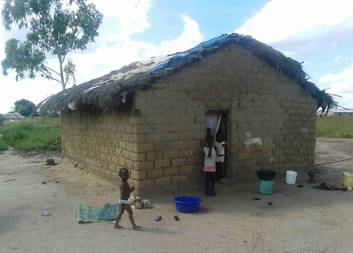Since the 1st of July 2014, Caritas Czech Republic has been securing the self-sufficiency of Zambian households and Angolan families in the areas of Mayukwayukwa and Meheba in Zambia. These families have been coming to Zambia as refugees since the 1960s.
The UN Refugee Agency (UNHCR) works in cooperation with the Zambian government to implement programmes of Local Integration. With a goal of supporting integration of Angolans into Zambian society, these programmes help families by legalising their places of residence, ensuring their free movement in the country and by granting greater access to education, public services and opportunities within the job market. In doing so, the programme supports individuals’ economic self-sufficiency and socio-cultural integration into local communities.
The activities of Caritas Czech Republic focus on two resettlement areas neighbouring refugee camps in Mayukwayukwa and Meheba. The former lies in the western province, in an area that is underdeveloped, remote and contains very limited infrastructure such as roads. The latter is situated in the north-western province, which is the second poorest province in the country but one which is developing very fast thanks to copper mining. The camp is located near the copper mine of Lumwana, which is one of the greatest copper deposits not only in Zambia but in the world. In comparison with the surroundings of the Mayukwayukwa camp, this is a very active area where the sales of crops grown by the refugees are high.
When visiting the Mayukwayukwa or Mehaba camps, you will not see the usual image of malnourished children, people living in tents or under hessian cloth, the UNHCR logo or fences with barbed wire. Since the 1960s, Angolans have sought refuge in Zambia from the civil war, as such families have been living here for up to three generations. The camps look like regular Zambian countryside where there are mud houses with thatched roofs and refugees who strive to earn a living by farming the land, by trade or by craft.
people living in tents or under hessian cloth, the UNHCR logo or fences with barbed wire. Since the 1960s, Angolans have sought refuge in Zambia from the civil war, as such families have been living here for up to three generations. The camps look like regular Zambian countryside where there are mud houses with thatched roofs and refugees who strive to earn a living by farming the land, by trade or by craft.
After the situation in Angola became relatively stable, most of the refugees returned home. Some of them however, do not consider departure acceptable because they feel detached from their home country and are afraid they might be refused by the local community. Their resettlement from the camps into carefully selected areas will enable them to gain land and secure a living.
For families in this area, the high dependency on agriculture also means they are vulnerable to potential risks such as irregular rain, droughts or diseases affecting the plants. Unfortunately, sometimes the yield from the fields hardly suffices to feed a family.
Because of this, Caritas Czech Republic intends to focus its efforts on implementing diverse sources of living for the resettled Angolan refugees and local Zambian families. For example, we will provide training for young people in trades like tailoring, woodwork and metal work. We will train men and women from 16 to 60 years of age in business skills and support various kinds of non‑agricultural activities which provide sources of income for family budgets.
Czech non-profit organisation Njovu o. p. s., also participates in this project financed by UNHCR. The organisation has rich experience in the area of apprenticeship and working with orphaned and endangered youth in Zambia.







